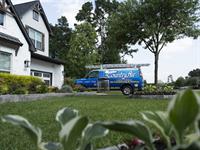AC Capacitors: Hoarding and Avoiding Scams
In May 2025, a conscientious homeowner requested online forum input about proactively pre-purchasing components for various large appliances. Air conditioning capacitors were her concern.
She wrote, “We live in a brutally hot climate most of the year with an older central AC and are very worried tariff impacts could create severe replacement part shortages and delays. AC is not a luxury here!” Our advice is to ask your local AC professional before making any decisions about hoarding HVAC components.
First, AC capacitors are traditionally inexpensive, but admittedly, component prices are rising throughout the HVAC industry. Second, if you are not trained and certified as a heating, ventilation, and air conditioning technician, replacing capacitors is a bad idea. (In fact, we suggest taking pictures as you work during any HVAC do-it-yourself repairs or replacements. That way, if we’re needed for damage control, our AC pro will be able to “see” what steps were taken.)
Finally, depending on the AC unit, a heating and cooling system can have two or more types of capacitors (blower, dual-run, heat pump, run, start); and yes, the tariffs already impact HVAC repairs and replacements, including capacitor supplies. Here’s how:
- Capacitors are electrical components and even U.S. manufacturers import these and other appliance parts. Industries facing higher HVAC equipment component costs are sharing the additional expenses with consumers.
- HVAC industry costs, including systems and their components, were already increasing in 2024, prior to the tariffs. Estimates are the tariffs will drive prices 15-30% higher in 2025.
- Shortages will cause longer wait times for replacements and repairs. AC or heat loss can be dangerous during extreme weather conditions.
AC Scams May Increase
Don’t expect hoarding AC capacitors to become a trend, even in Texas. However, scammers prey on fearful people. The fear of losing air conditioning in Texas heat because of a bad capacitor is very real and justifiable. If you don’t have a local, reputable HVAC company and seek air conditioning service or repair, you should watch for signs you are being scammed.
If the HVAC repair person:
- Can’t provide an estimate up front and can’t explain or break down the provided estimate
- Claims it’s critical to make your decision now
- Contacted you by phone with a “special offer”
- Discourages other estimates
- Has a “good deal” on used AC capacitors
- Has no online presence, including no independent reviews or website
- Pressures you to replace a working capacitor
- Requests cash upfront
- Suggests you buy a larger AC system than you need
…You may be getting scammed. Trust yourself; if the AC specialist seems overly aggressive, vague, or offers what feels like questionable advice, just say no. The right AC professional can show you what’s wrong with your capacitor and how a new part can remedy the problem. And the right AC company will guarantee its work as well as verify parts’ warranties.
Signs you have a bad AC capacitor include:
- Burning odor
- Delayed startups
- Noise (usually a humming sound)
- Oil leak or bulges
- Short cycling
- Unusual unit vibrations
- Vents blowing warm instead of cool air
It’s not just AC capacitors that can be exploited by unethical HVAC companies. Some common HVAC repair scams can include:
- Bait & switch – Amazing duct-cleaning offers, hard-to-refuse new AC unit prices… If it’s too good to be true, the original offer may be replaced by a “better” offer at a higher price.
- Bigger is better – If a company pushes oversized units for your small home, it’s likely a scam.
- Cracked heat exchanger – Furnace heat exchangers can crack and may need replacement, but always ask for a second opinion. Also ask the specialist to check for carbon monoxide leaks.
- Need to return with the right equipment – Be wary. HVAC professionals carry “the right equipment” with them.
- Payment upfront – It is unusual for any reputable HVAC company to request payment for services they haven’t yet provided. And no company today specifies cash-only.
- Pricing breakdown – Always confirm exactly what needs to be replaced/repaired and ask for prices. An honest company will be quick to provide information in writing.
- “R-22 is illegal” – If an HVAC technician says those words, run for the hills.
- Several parts are bad – The need to replace many different parts in a well-maintained HVAC system seldom occurs. If the technician says there are numerous defects, get a second opinion.
- Unnecessary refrigerant – There are signs you have a refrigerant leak in a sealed AC system. If you don’t have a leak, you don’t need refrigerant. If you are charged for “topping off” the refrigerant or if you’re charged more for refrigerant than is correct, ask for details.
If a HVAC technician says you need any type of repair, ask for proof.
Industry-best practices and best-in-business operations are why Country Air of Tomball and Magnolia has a 4.9-star Google rating, BBB A+ rating, and has received Neighborhood Favorite and Business of the Year awards. We’re the local HVAC company that genuinely cares about providing trusted, you-centric service and advice. We welcome your questions.
Country Air
-
Natalie Chumley Marketing Representative
- July 17, 2025
- Do Not Call
- Send Email

